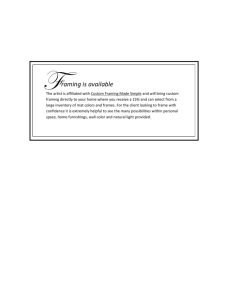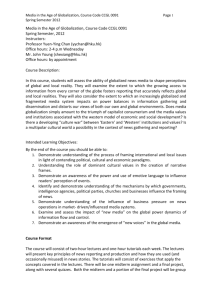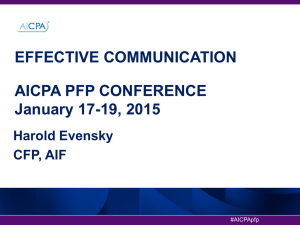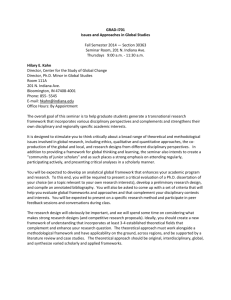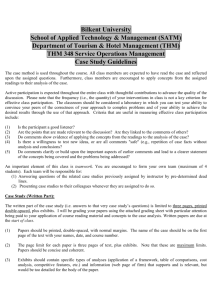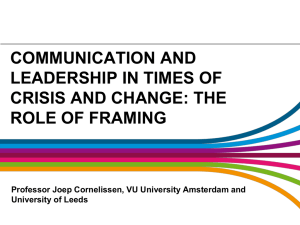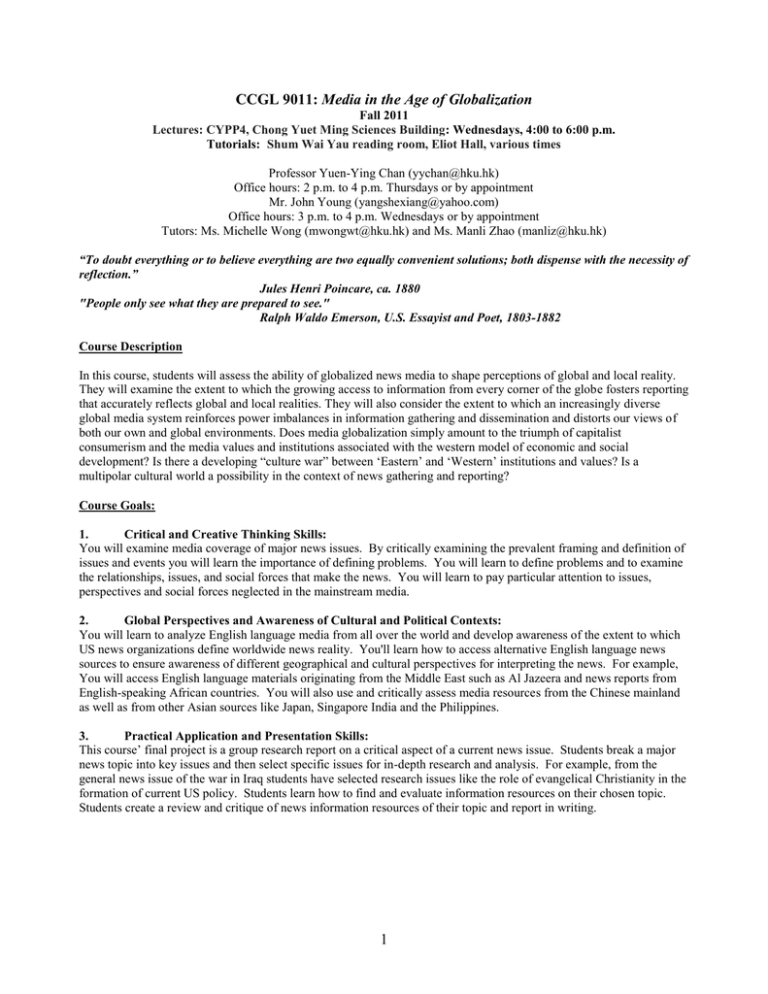
CCGL 9011: Media in the Age of Globalization
Fall 2011
Lectures: CYPP4, Chong Yuet Ming Sciences Building: Wednesdays, 4:00 to 6:00 p.m.
Tutorials: Shum Wai Yau reading room, Eliot Hall, various times
Professor Yuen-Ying Chan (yychan@hku.hk)
Office hours: 2 p.m. to 4 p.m. Thursdays or by appointment
Mr. John Young (yangshexiang@yahoo.com)
Office hours: 3 p.m. to 4 p.m. Wednesdays or by appointment
Tutors: Ms. Michelle Wong (mwongwt@hku.hk) and Ms. Manli Zhao (manliz@hku.hk)
“To doubt everything or to believe everything are two equally convenient solutions; both dispense with the necessity of
reflection.”
Jules Henri Poincare, ca. 1880
"People only see what they are prepared to see."
Ralph Waldo Emerson, U.S. Essayist and Poet, 1803-1882
Course Description
In this course, students will assess the ability of globalized news media to shape perceptions of global and local reality.
They will examine the extent to which the growing access to information from every corner of the globe fosters reporting
that accurately reflects global and local realities. They will also consider the extent to which an increasingly diverse
global media system reinforces power imbalances in information gathering and dissemination and distorts our views of
both our own and global environments. Does media globalization simply amount to the triumph of capitalist
consumerism and the media values and institutions associated with the western model of economic and social
development? Is there a developing “culture war” between ‘Eastern’ and ‘Western’ institutions and values? Is a
multipolar cultural world a possibility in the context of news gathering and reporting?
Course Goals:
1.
Critical and Creative Thinking Skills:
You will examine media coverage of major news issues. By critically examining the prevalent framing and definition of
issues and events you will learn the importance of defining problems. You will learn to define problems and to examine
the relationships, issues, and social forces that make the news. You will learn to pay particular attention to issues,
perspectives and social forces neglected in the mainstream media.
2.
Global Perspectives and Awareness of Cultural and Political Contexts:
You will learn to analyze English language media from all over the world and develop awareness of the extent to which
US news organizations define worldwide news reality. You'll learn how to access alternative English language news
sources to ensure awareness of different geographical and cultural perspectives for interpreting the news. For example,
You will access English language materials originating from the Middle East such as Al Jazeera and news reports from
English-speaking African countries. You will also use and critically assess media resources from the Chinese mainland
as well as from other Asian sources like Japan, Singapore India and the Philippines.
3.
Practical Application and Presentation Skills:
This course’ final project is a group research report on a critical aspect of a current news issue. Students break a major
news topic into key issues and then select specific issues for in-depth research and analysis. For example, from the
general news issue of the war in Iraq students have selected research issues like the role of evangelical Christianity in the
formation of current US policy. Students learn how to find and evaluate information resources on their chosen topic.
Students create a review and critique of news information resources of their topic and report in writing.
1
Learning Outcomes
By the end of this course, students should be able to:
1.
Demonstrate an understanding of the process of framing international and local issues in light of contending
political, cultural and economic paradigms.
2.
Apply an understanding of the importance of dominant cultural values to the creation of narrative frames.
3.
Demonstrate an awareness of the power and use of emotive language to influence readers’ perception of events.
4.
Identify and demonstrate understanding of the mechanisms by which governments, intelligence agencies,
political parties, churches and businesses influence the framing of news.
5.
Demonstrate understanding of the influence of business pressure on news operations in marketdriven/influenced media systems.
6.
Examine and assess the impact of “new media” on the global power dynamics of information flow and control.
7.
Demonstrate an awareness of the emergence of “new/alternative voices” in the global media.
Course Work and Assessment:
There will be one midterm assignment and a final project, along with several quizzes. Both the midterm and a portion of
the final project will be group projects. Students unable to work within a group may submit an individually prepared
report in satisfaction of the final project requirement. Topics for final projects will be announced at mid-semester.
Midterm Project:
Group project comparing a day's news in Hong Kong:
15% of total grade
Final Project:
Assessing and comparing local and international coverage of a current topic.
A written report comparing and analyzing news coverage of a topic or time period by two different news organizations.
10 pages plus references
45% of total grade
Take-home quizzes:
Three short writing assignments on the readings, lectures and current events.
20% of total grade
Group Debates and Presentations:
Informal and prepared debates and presentations conducted during tutorial sessions.
15% of total grade
Class Participation:
5% of total grade
Course Schedule:
Note on readings: Additional materials from various media sources (news stories, video clips, blog posts, etc.) may be
assigned to supplement the weekly background readings listed below.
WEEK 1: September 7, 2011
Introduction: The Framing of News
Course Overview
Readings:
Framing the News: Triggers, Frames and Messages in Newspaper Coverage, A Study of the Project for Excellence in
Journalism: http://www.journalism.org/node/445
The News About Democracy: An Introduction to Governing the American Political System, from News, The Politics of
Illusion, W. Lance Bennett, 2005, Pearson/Longman, pp. 1 to 30
WEEK 2: September 14, 2011
Structuring Reality: Power, Propaganda & the Pictures in Our Heads and Defining Reality: What Makes it into
the Papers?
Media Effects and the Power of Imposed Narrative, News Values and the Reporting Process
Readings:
Liberation Day, from Weapons of Mass Deception, Sheldon Rampton & John Stauber, 2003, Tarcher Penguin Press, pp.
1-8
2
The Picture in our Heads and Stereotypes, from Public Opinion, Walter Lippman, 1922, The Free Press, pp. 1-23, 5369, 85-100
The News About Democracy: An Introduction to Governing the American Political System, from News, The Politics of
Illusion, W. Lance Bennett, 2005, Pearson/Longman, pp. 1 to 30
WEEK 3: September 21, 2011
Language and the Power to Persuade: Connotative and Denotative Meanings of Words
Political Labeling and the Measurement of Meaning
Readings:
Are there Any Fallacies in the Reasoning? from Asking the Right Questions, A Guide to Critical Thinking (8th ed.), M.
Neil Browne and Stuart M. Keely, 2007, Pearson Prentice Hall
How the Language Really Works: Inference and Denotation, Inference and Association:
http://www.critical-reading.com/inference_denotation.htm
http://www.critical-reading.com/inference_association.htm
Politics and the English Language, George Orwell, 1946
http://www.netcharles.com/orwell/essays/politics-and-the-english-language.htm
Case Study for Tutorial: US and Chinese Coverage of the Arab Spring
FIRST TAKE-HOME QUIZ DUE
WEEK 4: September 28, 2011
Language and the Power to Persuade II
Readings:
Are there Any Fallacies in the Reasoning? from Asking the Right Questions, A Guide to Critical Thinking (8th ed.), M.
Neil Browne and Stuart M. Keely, 2007, Pearson Prentice Hall
How the Language Really Works: Inference and Denotation, Inference and Association:
http://www.critical-reading.com/inference_denotation.htm
http://www.critical-reading.com/inference_association.htm
Politics and the English Language, George Orwell, 1946
http://www.netcharles.com/orwell/essays/politics-english-language1.htm
Case Study for Tutorial: War Reporting from Iraq to Afghanistan
NO CLASS OCTOBER 5: CHEUNG YUNG FESTIVAL
WEEK 5: October 12, 2011
Language Continued
NO CLASS OCTOBER 19: READING WEEK
MIDTERM ASSIGNMENT: DUE NOVEMBER 2 BY 4 P.M.
Comparative piece on the Selection and Framing of News in Hong Kong Newspapers.
Details will be given in class.
WEEK 6: October 26, 2011
New Media and Citizen Journalism: Democratized News Gathering or Controlled Chaos
Wikileaks Leaks on Iraq Video and Afghanistan Documents
Readings:
Evaluating Internet Research Sources: www.virtualsalt.com/evalu8it.htm
A Guide to Critical Thinking About What You See on the Web: http://www.ithaca.edu/library/training/think.html
Case Study for Tutorial: Impact of Technology on Media Consumption
3
WEEK 7: November 2, 2011
Media Ownership and the Business of News, Part One: Advertising Revenue and the Upmarketing and
Segmentation of the Press
Readings:
Selected Chapters from Agents of Power: The Media and Public Policy (2nd ed.), J. Herbert Altschull, 1995, Longman.
Case Study for Tutorial: Hong Kong’s Media Culture
WEEK 8: November 9, 2011
Media Ownership and the Business of News, Part Two: Press Ownership and Editorial Decision making
Readings:
Inside the Profession: Objectivity and Political Authority, from News: The Politics of Illusion, W. Lance Bennett, 2005,
Pearson/Longman, pp. 180-202
Case Study for Tutorial: News of the World Phone Hacking Scandal
SECOND TAKE-HOME QUIZ DUE
WEEK 9: November 16, 2011
Spin Cycle: The ABCs of Media Manipulation
Political Propaganda and the Free Press, Public Relations, Disinformation, Psychological Operations and Think Tanks,
Public Opinion Polls
Readings:
Is the Press Any Match for Powerhouse PR?, Alicia Mundy, Columbia Journalism Review, September/October 1992
How Polls Are Conducted: http://www.gallup.com/poll/101872/how-does-gallup-polling-work.aspx
Case Study for Tutorial: Wikileaks
FINAL ASSIGNMENT: Final Project will be explained in class. Group and Individual written reports will be due
on DECEMBER 7.
WEEK 10: November 23, 2011
Earthshaking News: Media and Comparing Coverage of Disasters
Covering SARS, the Sichuan Earthquake, and the Wenzhou Train Incident; the Role of Twitter and Social Media
Readings:
Chinese Intellectuals Contemplate the Earthquake: Lessons We Are Learning
http://chinadigitaltimes.net/2008/05/chinese-intellectuals-contemplate-on-earthquake-lessons-we-are-learning/
Nieman Reports: Constraints on China’s Coverage of SARS:
http://www.nieman.harvard.edu/reportsitem.aspx?id=101212
Case Study for Tutorial: Social Media in China
THIRD TAKE-HOME QUIZ DUE
4
WEEK 11: November 30, 2011
New Voices in the Global Media: The Homogenization or Diversification of Worldwide News
Global Information Flows, Culture Wars and the Free Market Media
Media for a Multipolar World
Developmental Journalism and the Macbride Report
Emergence of New Players including Al Jazeera and Xinhua
Readings:
Looking Beyond Flawed Journalism: How National Interests, Patriotism, and Cultural Values Shaped the Coverage of
the Iraq War, Narasimhan Ravi, Harvard Journal of Press and Politics, Winter 2005, pp.45-61.
Power of a Third Kind: A Role for Developing Nations? from Power of a Third Kind: The Western Attempt to Colonize
the Global Village, Hisham M. Nazer, 1999, Praeger, pp. 119-145.
Declaration on Fundamental Principles Concerning the Contribution of the Mass Media to Strengthening Peace and
International Understanding, to the Promotion of Human Rights and to Countering Racialism, Apartheid and Incitement
to War, UNESCO Document 20C/20 21, November 1978.
Case Study for Tutorial: Models of State Media Expansion
ONLINE MAKE-UP SESSION (DATE TO BE ANNOUNCED)
Visual Journalism, Media and Culture
“Free Tibet” and the “Genocide Olympics”
Readings:
A Propaganda Model, from Manufacturing Consent: The Political Economy of the Mass Media, Edward S. Herman and
Noam Chomsky, 2002 Pantheon Press, pp.1-26
Case Study for Tutorial: Visual Journalism
FINAL PROJECT: DUE DECEMBER 7, 2011 BY 6 PM.
5
Course Grade Descriptors:
1. Demonstrate an understanding of
the process of framing international
and local issues in light of contending
political, cultural and economic
paradigms.
2. Apply an understanding of the
importance of dominant cultural
values to the creation of narrative
frames.
3. Demonstrate an awareness of the
power and use of emotive language to
influence readers’ perception of
events.
4. Identify and demonstrate
understanding of the mechanisms by
which governments, intelligence
agencies, political parties, churches
and businesses influence the framing
of news.
5. Demonstrate understanding of the
influence of business pressure on news
operations in market-driven/influenced
media systems.
6. Examine and assess the impact of
“new media” on the global power
dynamics of information flow and
control.
7. Demonstrate an awareness of the
emergence of “new/alternative voices”
in the global media.
A
Sophisticated
understanding of
the framing
process and its
surrounding
politics
Sophisticated
understanding of
the importance of
dominant cultural
values to the
creation of
narrative frames
High awareness of
the power and use
of emotive
language to
influence readers’
perception of
events
Sophisticated
understanding of
the mechanisms
by which different
institutions
influence the
framing of news
Sophisticated
understanding of
the influence of
business pressure
on news
operations in
marketdriven/influenced
media systems
Thorough and indepth examination
and assessment of
the impact of
“new media” on
the global power
dynamics of
information flow
and control
High awareness of
the emergence of
“new/alternative
voices” in the
global media
6
B
Clear
understanding of
the framing
process and its
surrounding
politics
Clear
understanding of
the importance of
dominant cultural
values to the
creation of
narrative frames
Moderate
awareness of the
power and use of
emotive language
to influence
readers’
perception of
events
Clear
understanding of
the mechanisms
by which different
institutions
influence the
framing of news
Clear
understanding of
the influence of
business pressure
on news
operations in
marketdriven/influenced
media systems
Thorough
examination and
assessment of the
impact of “new
media” on the
global power
dynamics of
information flow
and control
Moderate
awareness of the
emergence of
“new/alternative
voices” in the
global media
C
Understanding of
the framing
process and its
surrounding
politics
Understanding of
the importance
of dominant
cultural values to
the creation of
narrative frames
Some awareness
of the power and
use of emotive
language to
influence
readers’
perception of
events
Understanding of
the mechanisms
by which
different
institutions
influence the
framing of news
Understanding of
the influence of
business pressure
on news
operations in
marketdriven/influence
d media systems
Basic
examination and
assessment of the
impact of “new
media” on the
global power
dynamics of
information flow
and control
Some awareness
of the emergence
of
“new/alternative
voices” in the
global media
F
Little or no
understanding of
the framing
process and its
surrounding
politics
Little or no
understanding of
the importance of
dominant cultural
values to the
creation of
narrative frames
Little or no
awareness of the
power and use of
emotive language
to influence
readers’
perception of
events
Little or no
understanding of
the mechanisms
by which different
institutions
influence the
framing of news
Little or no
understanding of
the influence of
business pressure
on news
operations in
marketdriven/influenced
media systems
Partial or no
examination and
assessment of the
impact of “new
media” on the
global power
dynamics of
information flow
and control
Little or no
awareness of the
emergence of
“new/alternative
voices” in the
global media
Assessment Rubric
Each of your assignments will be assessed on at least one of the following criteria. All criteria are
equally weighted, so the final score for assignments with multiple criteria will be based on an
average of the scores for each relevant criterion.
1. Demonstrate an understanding of the process of framing
international and local issues in light of contending
political, cultural and economic paradigms.
2. Apply an understanding of the importance of dominant
cultural values to the creation of narrative frames.
3. Demonstrate an awareness of the power and use of
emotive language to influence readers’ perception of
events.
4. Identify and demonstrate understanding of the
mechanisms by which governments, intelligence agencies,
political parties, churches and businesses influence the
framing of news.
5. Demonstrate understanding of the influence of business
pressure on news operations in market-driven/influenced
media systems.
6. Examine and assess the impact of “new media” on the
global power dynamics of information flow and control.
7. Demonstrate an awareness of the emergence of
“new/alternative voices” in the global media.
7
A+
80
A
75
A- B+
70 67
B
63
B60
C+
57
C
53
C50
F
<49
80
75
70
67
63
60
57
53
50
<49
80
75
70
67
63
60
57
53
50
<49
80
75
70
67
63
60
57
53
50
<49
80
75
70
67
63
60
57
53
50
<49
80
75
70
67
63
60
57
53
50
<49
80
75
70
67
63
60
57
53
50
<49

